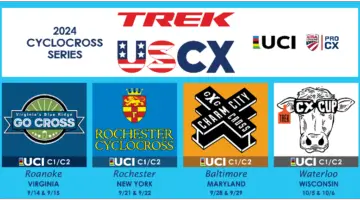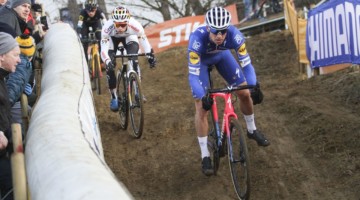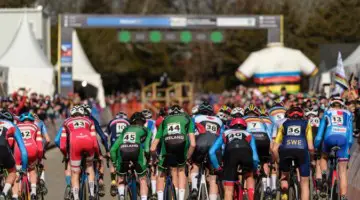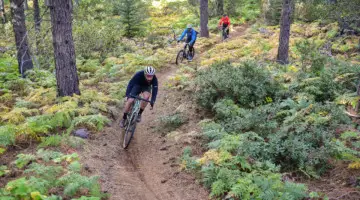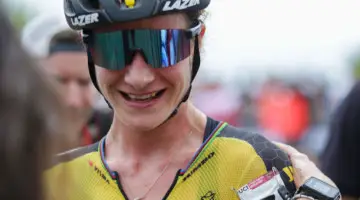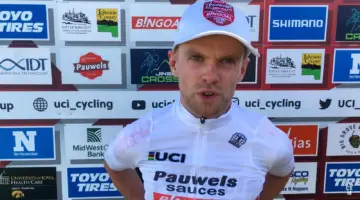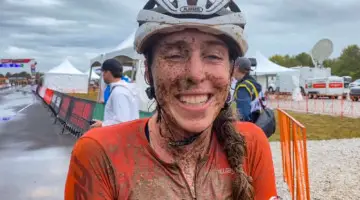Michael van den Ham (Garneau-Easton p/b Transitions LifeCare) has been one of Canada’s strongest cyclocross riders since moving up to the Elite level after winning U23 Canadian Nationals in 2013. At last weekend’s Canadian Nationals in Sherbrooke, QC, Van den Ham put preparation, mindfulness, strategy and skill together to win his first Elite National Championship.
Cyclocross Magazine spoke with Van den Ham about the victory. He provided an in-depth look at what it takes to win at the Elite level and how he learns to be a better rider from other athletes.
Interview with Michael van den Ham, Canadian National Champion
Cyclocross Magazine: How does it feel to finally get an Elite national championship? Is it what you expected?
Michael van den Ham: It’s hugely exciting! I’m so amazed by all the support that I’ve had both before and after winning nationals from my friends, family and sponsors. Every now and then I’ll be riding along or at work or in the car and the thought “I’m a National Champion!” will just pop into my head. After four years of trying, that gives me a huge amount of satisfaction.
That said, I’ve noticed that when a lot of athletes achieve a major career like this, the aftermath can actually be pretty tough on them. And that makes sense, if you’ve just accomplished your dream, what do you focus on next? I guess I knew this was a potential pitfall and am already looking towards the rest of the season. Winning nationals was amazing and I’m very proud of the accomplishment, but there is still a lot more I want out of this season.
Every now and then I’ll be riding along or at work or in the car and the thought “I’m a National Champion!” will just pop into my head.
CXM: Were you feeling pressure to win one after winning as a U23 and having success on the international stage?
MvdH: Yes and no.
While there was never any pressure to win from my team, sponsors or friends, I was placing a huge amount of pressure on myself to win. This was especially true last year. I wanted to win so badly that, in a lot of ways, I was self-sabotaging myself by doing things like opening up to hard the day before the race and spending too much time trying to dial in line the day of the race.
My coach, Al Donahue, had me do quite a bit of mental training this year and I think it really helped me put less pressure on myself for these individual races. I know this is a pretty common thing for athletes to say, but every year I’m racing I’m learning that it isn’t so much about the individual results, but dialing in the process. There are so many variables in a sport like cyclocross that are out of your control, that it’s just too much to try and worry about all of them.
If my old goal was to get a specific result, the goal I’ve been trying to focus on is getting the process down to the best of my ability. If I know I’ve done that when I arrive to the start line, then that’s all I can ask for. Whatever is going to happen in the race is going to happen, but I’ve done my part to be ready for a peak performance.
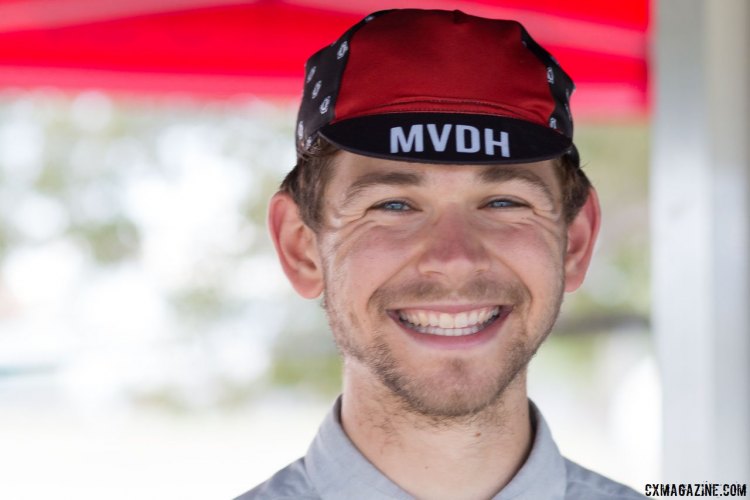
Michael van den Ham had a lot to smile about after Canadian Nationals this year. © Cyclocross Magazine
CXM: Your story sounds similar to Jeremy Powers’ before he won U.S. Nats, have you talked to other riders about what it takes to have everything come together on that one day?
MvdH: I’ve never talked to Jeremy about how he won his first Nationals, but I’d be lying if I said I didn’t look at his experience pretty closely and see the correlation to mine. A lot like Jeremy, I’ve probably been strong enough to win Nationals already for a couple years before I did, but for a variety of reasons it didn’t happen.
I can’t say I spoke directly to any athletes about it either, but I love to listen to podcast or interviews that get inside the heads of people who are the best at what they do. The Tim Ferris podcasts are great for this. They show there seems to be a few commonalities between successful people: they’ve failed before, they make plans and they take time out of their crazy schedules to do things like meditate.
I’ll be the first to admit that I’m a long way off the level of success of the people Tim interviews, but I do think that by exposing myself to the stories and experiences of those world-class performers, I am beginning to learn more about what it takes to reach the top. Like I was saying before, I’ve probably had the legs to win Nationals for a couple years ago, but I think the season it took until this year is because it’s only recently that I’ve had the maturity to win Nationals.
I’ve never talked to Jeremy about how he won his first Nationals, but I’d be lying if I said I didn’t look at his experience pretty closely and see the correlation to mine.
CXM: In the U.S. we have Nationals at the end of the season. Do you think mid-season Nats changes how you have to prepare for the event?
MvdH: It actually fits in pretty well with the hectic early-season schedule in the U.S. We have to be so fit for the first couple months of the season anyway, so it’s not a stretch to focus on finding good form from mid-September until our Nationals. Of course, I didn’t race everything in that block. I decided to sit out a couple of the early season C1’s like Rochester and KMC partly to get some training in and partly because I live on the West Coast and have a job!
The hardest thing is actually refocusing for the second half of the season. I mean, I just accomplished one of my biggest goals of the year! There is a huge part of me that wants to kick back, eat some frites and stop training hard, but the reality is that I still have three months of cyclocross season ahead of me.
In the end, I gave myself two days for some relatively modest celebration before getting serious about training again for the Pan-Am Championships.
CXM: Was Sherbrooke a good course for your skill set?
MvdH: It was just about perfect for me. It rained all day on Thursday, but by the time we raced on Saturday, the course was tacky in most places but still slick enough in others to be technically challenging. My ideal course is something with lots of pedaling and some tricky technical sections that don’t lend themselves to group racing. Sherbrooke ticked all those boxes.
CXM: Sounds like your tire choice played an important role in winning. How did you get the win?
MvdH: Mark McConnell and I managed to get a small gap on the second lap. Not a lot, but something around ten seconds. As I said, earlier, I knew forcing Geoff to chase was probably my best chance for the win, so I was keen to force the pace a little. At the same time, I’ve raced against Mark since we both started racing ‘cross almost a decade ago and knew that I didn’t want to bring him to the line either.
The was a run-up about midway through the race that I thought might be rideable. Actually, I knew it was rideable. Right before the women’s race started I snuck away, made sure none of my competitors were watching and gave it a go. I even put my Easton 40t chainring on and set up my Vittoria Terrenos just for the run-up. I guess you could say it was my first ever moment of Svenness! Anyways, on lap 3 or 4, I could see that Mark was starting to make mistakes, so I squared it up, rode the run-up, and got the gap that I held for the rest of the race.
CXM: What’s it like racing against someone like Geoff Kabush, who has so much experience in bike racing?
MvdH: One of my biggest fears leading into the race is that I’d bring Geoff to the line, so fortunately I didn’t have to race down the stretch with him! I’ve watched enough fat tire crits to know that there are few people out that that are better finishers than he is. A big part of my race strategy involved getting a gap on Geoff sometime before the midpoint of the race. I figured my best bet for winning was making sure the race was as hard as possible and make sure that tactics had very little to do with the final outcome. Thankfully that’s more or less what happened and for the last three laps, it was more or less Geoff versus myself with ten seconds between us.
I have a huge amount of respect Geoff. Not only has he been a dominant force in Canadian Cycling for almost two decades and someone I looked up to when I started racing, but he is also one of the few riders from the early 2000s that competed on the international stage completely clean. The more I learn about the sport in that era, the more I realize how incredible of a person that makes him.
CXM: How does Canadian cyclocross compare to what you’ve experienced in the U.S.?
MvdH: Pretty similar, but we certainly have a bit of a smaller scene. I think that makes the whole thing a little more grassroots, a little more like a big family. Which is remarkable because cyclocross is a pretty grassroots sport wherever you are.
I love racing the local scene in Canada. I’m sure all riders have a preference for their own scene, but I owe a lot to the local Alberta cyclocross community. It’s where I learned how to race ’cross and I still count pretty well every person at those races as a friend.
That said, while there has been a lot of talk in the U.S. about the sport plateauing over the past couple of years, the Canadian scene seems to be experiencing the type of growth that the U.S. scene saw five years ago. We’re starting to see a few more UCI races pop up in Canada, and when I look at the riders that are coming out of the Junior and U23 ranks, I’m optimistic that the Canadian scene is only going to continue growing.
CXM: In the U.S. we do the Stars and Stripes jersey. Is it called the Maple Leaf jersey? Different name?
MvdH: Yeah, It’s not a very exciting name is it? Maybe we should put some maple syrup on it. Or a moose. Or a beaver. Or hockey. Or maybe all four?
Maybe we should put some maple syrup on it. Or a moose. Or a beaver. Or hockey. Or maybe all four?
CXM: Anything else you’d like to add?
None of this would have been possible without Craig Richey and Dylan Postier, the other owners of Garneau-Easton p/b Transitions Life Care, all of the team’s sponsors (ethicalracingproject.com or @garneaueaston on Instagram), my wife, Al Donahue, Adam Myerson and Shaun Adamson from Cycle-Smart, my family and all of my friends.
Each of these people played a huge part in getting me to where I am today. So thank you!











